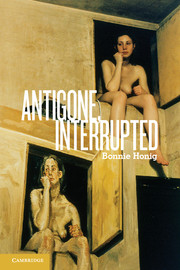Introduction
Published online by Cambridge University Press: 05 May 2013
Summary
The inter of a political interesse is that of an interruption or an interval. The political community is a community of interruptions, fractures, irregular and local . . .
Jacques RancièreThe lifespan of man running towards death would inevitably carry everything human to ruin and destruction if it were not for the faculty of interrupting it and beginning something new, a faculty which is inherent in action like an ever-present reminder that men, though they may die, are not born in order to die but in order to begin.
Hannah ArendtInterruption is one of the fundamental procedures constitutive of form. It extends far beyond the orbit of art. It lies at the root – to take only one example – of citation. To cite a text means to interrupt its context.
Walter BenjaminThis book is divided into two parts. In Part I, Interruption, I look at the role of Sophocles’ play and its heroine in contemporary debates about agency, power, sovereignty, and sexuality. I suggest that the turn to Antigone in the latter half of the twentieth century and the first years of the twenty-first is best seen in the context of a series of turns to ethics, humanism, or maternalism, each aimed at countering certain forms of sovereignty or rationality (identified often with Oedipus). Lamenting sovereignty’s excesses and the disappointments of rationalism, theorists and critics then seem to find in that very lamentation a new universalism that might take the place of these discredited contenders: whatever our differences, we are all mortal and we all lament our finitude, since the time of Antigone. Thus, for them, lamentation also reassures as it steps in to take the place of the very thing whose loss we lament: universalism.
I go on to ask whether feminist and democratic theorists might rethink the rejection of sovereignty and consider devoting themselves instead to its cultivation. We might be critical of sovereignty’s operations in particular contexts while still seeking to enlist the powers of sovereignty in others, for our own democratic or redistributive agendas. Analyzing some turns to Antigone, I ask whether the conventional figure of Antigone herself, much admired for her principled dissidence but also for her self-sacrifice, ultimately presses a certain impotence and resignation on her admirers as she leads them to embrace, as they think she once did, a politics of lamentation.
- Type
- Chapter
- Information
- Antigone, Interrupted , pp. 1 - 10Publisher: Cambridge University PressPrint publication year: 2013



